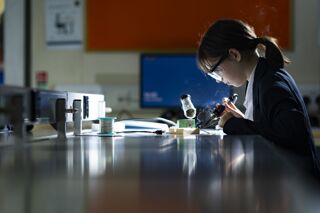- Home
- Personal Development
- Equality & Diversity
Equality & Diversity
Diversity and Inclusion in the Curriculum
 It is vital that the school promotes equality of opportunity and diversity effectively to ensure that pupils understand, appreciate and respect difference in the world and its people. We must celebrate our differences alongside the things we share in common across cultural, religious, ethnic and socio-economic communities. Our curriculum plays a key role in shaping these values, embedding diverse perspectives, voices and experiences across subjects to foster an inclusive and respectful learning environment.
It is vital that the school promotes equality of opportunity and diversity effectively to ensure that pupils understand, appreciate and respect difference in the world and its people. We must celebrate our differences alongside the things we share in common across cultural, religious, ethnic and socio-economic communities. Our curriculum plays a key role in shaping these values, embedding diverse perspectives, voices and experiences across subjects to foster an inclusive and respectful learning environment.
In PSHE, students explore identity, discrimination and bias, with lessons on visible and invisible differences, LGBTQ+ inclusion and challenging stereotypes. Topics such as diversity, racism and learning disabilities help students understand and challenge societal prejudices.
Character Education enhances this by covering Black History Month, Holocaust Memorial Day and Human Rights, with discussions on prejudice, stereotyping and social justice.
English celebrates different identities through a diverse selection of texts, from indigenous myths to poetry and prose that explore race, gender and marginalisation. GCSE and A-Level literature includes texts that highlight the consequences of inequality, and visiting authors bring real-world experiences into the classroom.
Science represents diversity through topics such as human variation, genetics, environmental justice and the impact of climate change on different communities. Contributions from a range of scientists are highlighted, and diverse role models in STEM are promoted.
In Religious and Philosophical Education (RPE), students engage with major world religions and secular perspectives, discussing topics such as religious discrimination, interfaith dialogue and ethical issues from multiple viewpoints. The subject also includes representation of women, LGBTQ+ individuals and people with disabilities within religious traditions, with guest speakers and case studies bringing these discussions to life.
Languages explore cultural traditions in the Francophone and Hispanic worlds, using these as a springboard for discussions on empathy, awareness and social norms. All students receive equal exposure to cultural discussions through structured schemes of work.
History, Geography, Sociology and Psychology naturally provide space for exploring historical and contemporary issues relating to diversity and inclusion, with a focus on ensuring a wide range of perspectives are embedded in lesson content.
Computing discusses representation in technology, including Alan Turing’s story and the impact of stereotypes in media.
Business and Economics examine social impact and the importance of diversity in global industries.
In Music, Art and Drama, students explore marginalised voices and cultural influences, from enslaved musicians to contemporary LGBTQ+ artists and designers. Art projects focus on diverse practitioners, including those with disabilities, and explore themes such as race, identity and colonialism. Music lessons cover the historical development of popular genres and their links to issues such as racism and segregation.
Physical Education and Dance foster an inclusive approach by offering a variety of activities that cater to different interests and abilities. Lessons focus on cooperation, participation and personal growth alongside traditional sports, with opportunities for students to express themselves through dance and movement. The curriculum continues to evolve, incorporating emerging sports and fitness trends influenced by diverse cultures.
Across all subjects, every pupil is seen, valued and represented in their learning. By embedding diversity and inclusion at every stage, the curriculum reflects the diverse world around us and prepares students to contribute to an inclusive society.